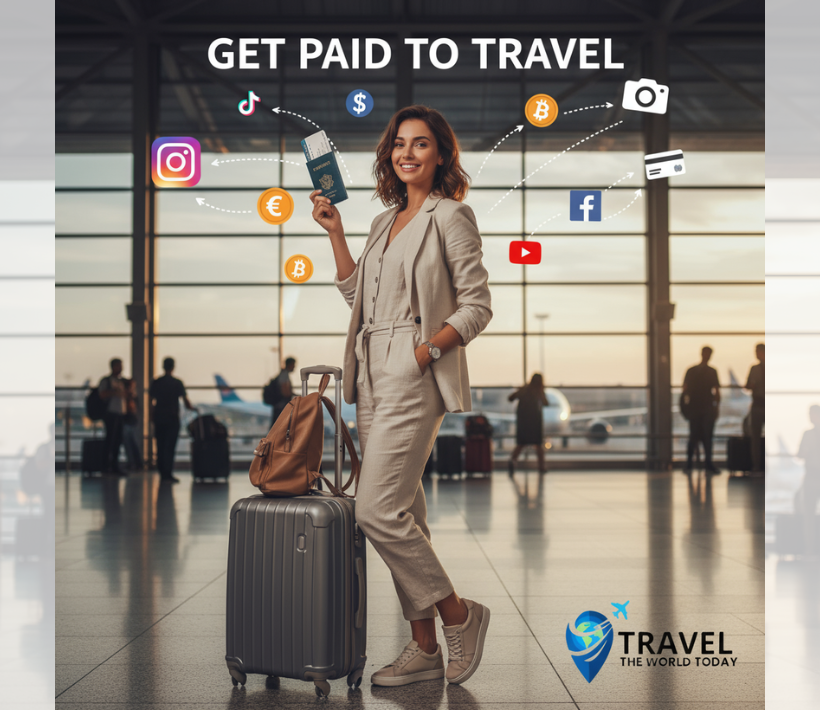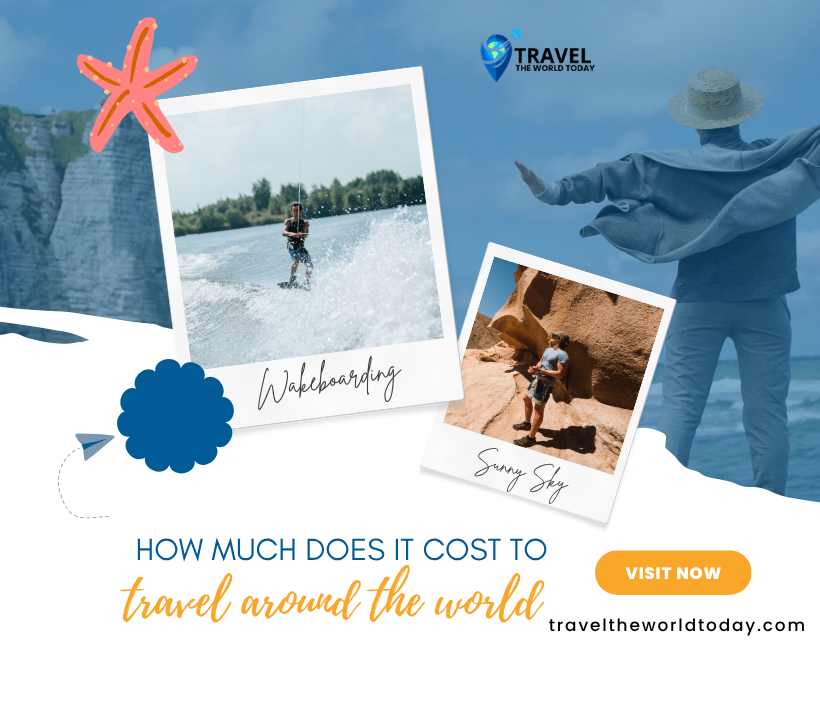How to get paid to travel and see the world full-time?
Picture waking up in Bali, working from a beachside café in Portugal, or exploring ancient temples in Thailand — all while making money. It’s no longer a fairy tale that someone will pay you to travel. Full-time adventures are funded through these sustainable income streams, which is what thousands of people have done around the world.
It’s easier and easier to earn money that doesn’t tie you down in the age of remote work, online platforms, and the gig economy. You don’t have to be the beneficiary of a trust fund or lottery winnings to see the world. What you need is a good plan, marketable skills, and some determination. This is the ultimate guide exposing how to translate your wildest travel fantasies into reality and be financially responsible.
Whether you’re a recent graduate, career changer, or experienced professional looking for adventure, there are opportunities for all levels and types of experience. Here’s how you can begin getting paid to travel and visit various cultures, foods, and landscapes around the world.
Why It’s Easier Than Ever to Make Money Traveling
Career success is no longer typified by the time-honored 9-to-5 office job. Remote work has exploded ever since 2020 and millions of jobs today are location-independent. Businesses know talent is everywhere, not just within commuting distance of headquarters.
Technology is a major influencer of this change. Broadband reaches even the most remote corners of the globe, allowing work to be done almost anywhere. Communication platforms such as Zoom, Slack, and Asana help make collaboration across time zones easy.
Travel costs, for their part, have become more reasonable. Budget airlines, cheap places to stay on Airbnb, and co-working spaces in developing countries make it easy to live for less than you would in expensive American cities. Nations such as Vietnam, Portugal, and Mexico provide an outsize quality of life for just a tiny fraction of U.S. costs.

Top 10 Ways How to get paid to travel
Travel Blogger/Content Creator
Travel blogging is still one of the most popular ways How to get paid to travel, and it’s part of a lifestyle business model that people who are good with cameras can use to become influencers on Instagram. You generate content promoting your travels in blog posts, Instagram pictures, YouTube videos, or TikTok clips. Revenue is generated by sponsored posts, affiliate marketing, display advertising, and selling digital products.
Success requires consistency and authenticity. You have to keep writing, interacting with your readers, and finding a unique voice. Great travel creators are often known for niches that include budget travel, luxury trips, solo female travel, and adventure sports.
It takes time to build an audience: 12 to 24 months is often necessary before you will start to see significant earnings. But, get past this hurdle, and you will find that the creation of travel content offers freedom and earning potential for 6-figure incomes to the best content creators.
Freelancing as a Digital Nomad
Freelancing allows to work from any place at the same time to earn competitive rates. They range from writing and graphic design to web development, digital marketing, video editing, and consulting. Freelancing platforms such as Upwork, Fiverr, and Freelancer match you with clients around the world.
Most digital nomads make $50,000 to $100,000+ a year (depending on their area of expertise and number of clients). You make your own schedule, you choose the projects you want to work on and that fit in with the hours that best complement your travel plans. Many freelancers do their work in the a.m. and then explore in the p.m.
Establishing a good list of clients before you leave can ensure a steady income on the road. Begin as a part-time freelancer (while you still have your full-time job), and move to full-time once you develop steady income sources.
Teach English Abroad or Online
With TEFL, you can travel and How to get paid to travel to work in dozens of countries around the world. Countries from South Korea to Japan, China, Vietnam, and Saudi Arabia entice native English speakers away. Perks generally include salary, lodging, airfare, and health coverage.
In some countries, you need a bachelor’s degree and a TEFL / TESOL certificate; in other countries not so much. Pay is $1,500-$5,000+ a month (depending on location and qualifications). You’ll have regular hours, but evenings, weekends, and school holidays to explore.
There is even more flexibility when it comes to teaching English online. Companies like VIPKid, iTalki, and Cambly allow you to teach from anywhere with a dependable internet connection. You make your own schedule and can earn $15 to $25 an hour with direct hourly tutoring work for students all over the world.
Work on a Cruise or Yachts
Cruise ship employment offers the majority of the amenities for free, such as lodging and food, as well as working in outstanding locations with payment. They are also hiring positions such as entertainment staff, fitness instructors, bartenders, chefs, and customer service representatives. Contracts usually run for six to nine months.
Living at sea means adjusting to cramped living quarters and hectic work schedules. But you’ll see many countries, save money by not spending anything, and meet people from all over the globe. At an entry level, positions begin at about $1,500 a month; those involving specialized knowledge command considerably higher pay.
The positions on yachts the offer similar rewards in a more personal working condition. Large yachts take on deckhands, stewardesses, chefs, and engineers. Yachting pays more, and the destinations are exotic, though with more competition for jobs.
How to get paid to travel photographer or videographer
Travel photographer or videographer — visual storytelling skills are in high demand since businesses and publications actively buy authentic travel content. Apart from selling pictures to stock photo sites, travel photographers also work with tourism boards and photograph events or create content for brands, hotels, or other companies.
In any case, you need a solid portfolio to start, so begin taking pictures of your own travels and sharing them on Instagram or specialized platforms like 500px. Once your skills improve, pitch publications or approach tourism companies, hotels, or other travelers to offer photography services. Travel photography bonuses depend on experience and client type, to name passive income from stock photography or money from $500 to $5000+ per project with commercial clients.
How to get paid to travel: House sitting and pet sitting jobs
House sitting and pet sitting jobs — house sitting allows you to live in beautiful homes worldwide at no cost while caring for other people’s properties and pets. With various platforms like TrustedHousesitters, House Carers, or Mind My House, homeowners can find house sitters worldwide. Jobs may last from several days to several months, so flexible traveling is a great option. Since you save on accommodation up to several thousand dollars annually, competition for desirable locations is fierce. Help yourself with references and reviews to excel. Tour guide or travel coordinator — working as a guide for travel companies, Airbnb Experiences, or Get Your Guide, or leading adventure trips.

How to get paid to travel From Hiking?
Guides make between $50 – $300+ per tour, depending on the size of the group, length of time, and level of specialization. Hiking, kayaking, or cycling tour guides for adventure-based companies make more, in many cases, because of certifications and knowledge. Working at different seasons enables you to travel from place to place after the high tourist flow.
Then there are travel coordinators, who arrange anything from overnights at a bed-and-breakfast to long-term stays anywhere in the world..forChildID forclinker.TextUtils.FirstLine = TRUE > Travel Coordinators work remotely to make travel arrangements come together, coordinate trips (visas, passports), and process requests or provide recommendations on vacation location.. The Work: This is a perfect fit for the organized and well-read who are Research Rooks travel experiencecuriosity seekers, but also people who want ‘Real-life’ practice and being able How to get paid to travel virtually while sometimes scouting out destinations.
Telecommute Customer Service and Virtual Assistant Positions
More and more customer service agents, as well as virtual assistants, work remotely or online. Companies across all sorts of industries require support staff to help customers answer questions, process orders, keep their schedules in check and complete any number of other administrative tasks, at home.
These jobs usually pay $15 to $30 an hour, and some even offer set hours so you can accommodate business time zones. Still others let you set your own schedule even while away on vacation. You just need stable internet access and a quiet place to work.
For virtual assistant work, the tasks are often more diverse, such as social media and email management, accounting, and project organizing. Working with different clients gives you the security of guaranteed income, and you can always pick specific projects according to your interests.
Become a Flight Attendant
The perks for flight attendants include free flights and travel discounts, as well as the ability to explore destination cities on layovers. At major airlines, pay is competitive and starts between $30,000 $50,000 a year and increases with experience and on international flights.
Training programs, which last several weeks, include training in safety procedures, customer service, and emergency protocols. It is a job that demands physical stamina, flexibility in hours, and great people skills. You will have a schedule that is anything but regular, involving overnights and weekends, and holidays.
And the perks go beyond your own travel, as immediate family members receive cheap or free flights. (not much time to sightsee, perhaps depending on the layovers in international cities) But you will grind during your flights. This is a career for people who have a lot of energy, can thrive in a fast-paced environment, and really love helping people.
Work in Hospitality Exchange Programs
Organizations such as WWOOF (World Wide Opportunities on Organic Farms), Workaway, and HelpX pair travelers with hosts who provide accommodations, meals, and sometimes money in return for work. You’ll be employed 20 to 30 hours a week on organic farms, in hostels, eco-projects, or other family-run businesses.
This option is perfect for budget travelers who are willing to roll up their sleeves in exchange for cultural immersion and a roof over their head. You won’t be making a traditional salary, but you’ll save loads on costs and have experiences not readily available to the average tourist.
A significant proportion of participants combine hospitality exchange with freelancing or savings, leading to travel periods so long that it feels like they are no longer traveling! You’ll live like a local, learn new skills, and establish international friendships while getting to know countries you never dreamed you’d visit at pennies on the dollar for the normal cost.
Valuable Skills You Need to Know How to get paid to travel
Paid travel: the most important skill “Adaptability is the number one skill to have for paid travel. The plans are always changing, the internet goes down, and there are constant surprise challenges. Good travelers learn to live with uncertainty and work around it rather than getting irritated.
Good communication will allow you to engage with clients, partner with teammates in different time zones, and adapt to a foreign culture. Both written and verbal clarity lead to project success, no matter which field you are freelancing in, be it learning or teaching new subjects, or creating content.
Self-regulation is the quality that distinguishes successful traveling business people from those who don’t make it. With no office environment in the traditional sense, you need to be good at managing your time and maintaining routine, meeting deadlines consistently, and being productive whilst surrounded by distracting new places.
Specific technical knowledge will depend on the career path pursued, but some to consider are:
- You’re proficient in digital tools (Slack, Zoom, Asana, Trello…)
- Simple fixes for your internet and device problems
- Financial management and budgeting
- Understanding social media for self-promotion
- Ability to research and identify opportunities and problems.
Appropriateness and language degree support are significant. Even knowing a few local phrases can help open doors to genuine connections and show respect for host communities.

What’s the Real Money You Can Make Here?
You have to consider that income can vary incredibly based on your path, skills, and experience, etc. Here is a more practical estimate of earning opportunities based on methods How to get paid to travel:
| Career Path | Annual Income Range | Time to Profitability | Difficulty Level |
|---|---|---|---|
| Travel Blogger/Creator | $0 – $150,000+ | 12-24 months | High |
| Freelance Professional | $30,000 – $150,000+ | 3-6 months | Medium |
| English Teacher Abroad | $18,000 – $60,000 | Immediate | Low-Medium |
| Online English Teacher | $15,000 – $40,000 | 1-3 months | Low |
| Cruise Ship Worker | $18,000 – $50,000 | Immediate | Low-Medium |
| Travel Photographer | $20,000 – $100,000+ | 6-18 months | Medium-High |
| Tour Guide | $20,000 – $60,000 | 3-6 months | Medium |
| Virtual Assistant | $25,000 – $60,000 | 1-3 months | Low-Medium |
| Flight Attendant | $30,000 – $80,000 | Immediate after training | Medium |
| Remote Customer Service | $25,000 – $45,000 | Immediate | Immediately after training |
Cost of living is radically different all across the earth; keep that in mind. Making $2,000 a month might be tight living in New York City, but is comfortably high living in Thailand, Mexico, or Portugal. For many tourists, their destination is chosen largely based on where they can get the most for their dollar.
Diversification of your income leads to financial security. Countless well-traveled professionals gig on the side while they launch a blog, teach English while learning photography or simply take remote work assignments and house sit/pay little rent.
How to get paid to travel – 7 Steps To Taking Places happening:
Step 1: Evaluate what you already know and like doing.
List the skills from your current job that you can transfer. Can you write, design, code, and teach? Rie or manage projects? Find the paid travel opportunities that match your current skill set rather than needing to start from scratch.
Step 2: Pick Your Main Income Method
Choose one or two streams of income to start with. When you do everything at the same time, you burn out and get just mediocre results. Do your research, read success stories, and know what is required of you in your field of choice.
Step 3: Acquire Essential Skills and Certifications
Invest in training before departing. Get a full TEFL certification to teach, sign up for online classes that will teach you freelance skills like writing and editing, or pull together a portfolio of your capabilities. There are a ton of free or relatively inexpensive resources online on places like Coursera, Udemy, and YouTube.
Step 4: Build your online presence.
Create a professional website, LinkedIn, and industry-relevant social media profiles. Your online presence is your resume and portfolio when you’re looking for remote work. You can showcase your work, demonstrate your expertise, and network in the industry.

Step 5: Begin Creating Income Before Traveling
Don’t quit your job and hope for the best. Do some freelancing or online teaching or content creation while still holding on to the job. This method eases financial burden and proves your business model before investing completely.
Step 6: Establish an Emergency Fund
Establish a buffer of $3,000 to $10,000 before leaving based on your risk tolerance and income stability. Unexpected expenses, client intervals, or emergencies occur. A financial cushion is a comfort and will help ensure you don’t get stuck stranded overseas.
Step 7: Be Intentional About Your First Destination
Choose areas with low cost of living, strong internet, and existing groups of remote workers. Gone are the days when cities with “established footings” in Chiang Mai and Lisbon have popped up and delivered places with infrastructure for everyone who would like to work while on their adventurous travels (Medellín, Bali). Find other people who do similar work through coworking spaces and digital nomad communities.
Step 8: Use short journeys to test your setup
Do a rainy two-week working vacation before making long-term travel plans. This trial period exposes logistical problems, such as time zone woes, unstable internet, or work-life balance. Adapt your process based on those findings.
Step 9: Launch and Be Ready to Pivot
Leap when you feel ready, knowing that ideal timing seldom exists. Remain flexible as you learn what works best for your specific situation. Most travelers find their journey becoming different from what they might have had in mind.
10: Never Stop Getting Better and Expanding Your Coverage.
Invest in your skills constantly, diversify your income streams, and hone, sharpen your processes. The long-termers who have successfully made a business out of life on the road, constantly tweaking it for maximized income vs maximized fun.
Typical Difficulties and How to Solve Them
Loneliness and Isolation
Constantly being on the road can also result in disconnection, even when surrounded by people. Combat that by staying in places for longer (slow travel), working out of coworking spaces, going to meetups, and doing regular video calls with friends and family back home.
Inconsistent Income
Freelance (and creative work in general) can be up and down from month to month. Address this through diversifying revenue, having a recurring revenue stream model, keeping a bigger financial cushion, and picking cheaper countries when income is lower.
Time Zone Confusion
When you work with clients across multiple time zones, it can be a scheduling nightmare. Leverage world clock apps, be very explicit about your availability, and take into account which time zone profiles are most consistent with your clients’ business hours when selecting locations.

Visa and Legal Issues
Different countries have different visa and work regulations. Do your homework beforehand, work with immigration professionals when necessary, and make sure you stay on the right side of the law. Tourist visas generally prohibit local work, but not remote work for foreign employers.
Burnout from Constant Movement
Even the most eager of travelers gets worn out from constantly being on the go. Opt for slow travel: Spend a few months in each place. This slashes costs, gives you a greater cultural experience and some stability to balance the fun of living abroad.
Maintaining Productivity in New Environments
Too many temptations in a fun city. Create predictable schedules, define specific work times, implement productivity tactics (Pomodoro Technique), and reward yourself with adventures after completing your toil.
Top Countries That Pay The Best For Traveling
Thailand
Thailand is still one of the meccas for how to get paid to travel. Both Bangkok and Chiang Mai are home to fantastic coworking spaces, are very affordable to live in, and have a strong expat community. Monthly spending is between $800-$1500 for a comfortable lifestyle.
Portugal
Lisbon and Porto appeal to tourists with stunning landscapes, historical treasures, and a welcoming cultural climate. Portugal’s digital nomad visa is making long-term stays more straightforward. Plan to pay between $1,500 and $2,500 monthly, depending on lifestyle.
Mexico
Regions like Playa del Carmen, Mexico City, and Oaxaca offer great infrastructure for remote workers. Location close to the U.S. market results in a low time zone difference with American customers. Most budgets are between $1,000 $2,000 a month.
Vietnam
Ho Chi Minh City and Hanoi are great places to live on the cheap with amazing food and very friendly locals. Vietnam is hot because of fast internet and emerging digital nomad scenes. You can live well on $800 to $1,200 a month.

Spain
Barcelona and Valencia offer a mix of culture, beach, and quality of life. (Indeed, Spain was among the governments that recently unveiled a digital nomad visa to streamline legal residency.) Plan on spending $1,800 to $3,000 a month, depending on the city and lifestyle.
Indonesia
Neighborhoods like Canggu and Ubud in Bali are built specifically for remote professionals on flexible schedules. You also won’t be breaking the bank – even factoring in your tourist costs, you’ll enjoy low-cost housing and endless socializing opportunities. Monthly costs range from $1,000 to $2,000.
Essential Tools and Resources
Communication and Collaboration
- Slack for team communication
- Zoom for video meetings
- Asana or Trello for project management
- Google Workspace for document collaboration
Financial Management
- Wise (formerly TransferWise) for international transfers
- Revolut for multi-currency banking
- QuickBooks for invoicing and accounting
- PayPal or Stripe for receiving payments
Finding Work and Opportunities
- Upwork and Fiverr for freelancing
- Remote.co and We Work Remotely for job boards
- TrustedHousesitters for house sitting
- Workaway for hospitality exchange
Travel Planning
- Skyscanner and Google Flights for airfare
- Booking.com and Airbnb for accommodation
- Nomad List for destination research
- Rome2rio for transportation planning
Connectivity
- Use internet speed test apps before booking accommodation
- Skyroam or GlocalMe for portable WiFi
- Local SIM cards for mobile data
- VPN services like NordVPN for security
Conclusion
Having a job that How to get paid to travel goes from being a distant dream to a reality by approaching it strategically. You have learned several different strategies they can use to maintain location independence and earn money, such as freelancing, teaching, doing content creation work, or service-based work.
Success doesn’t happen overnight. Only those who are willing to learn, persevere, and be persistent will be able to create continuous sources of income. Pick a few of the tactics that apply to your specific skill set, get some training under your belt, and start working on how you can make money now first. Your emergency fund offers you security in the early days of your traveling career.
The world is full of opportunities for those who refuse to work normally. From Southeast Asia for the budget-minded to Europe for those who prefer culture, as well as Latin America for the adventure-seekers–some destinations cater to every dollar amount and taste. Technology and remote work trends keep making this lifestyle accessible year over year.
Take the first step today. Evaluate your abilities, investigate opportunities, and develop your plan of action. Thousands who have gone before you have changed their lives with paid travel — and you can too. All of the knowledge, self-growth and memories you will acquire are worth many more than any struggles faced along the way.
Ready to bring your travel dreams to life? Get started on building your location-independent career today and become part of the community of individuals who are living life on their own terms and experiencing all that our amazing planet has to offer.

FAQ’s on How to get paid to travel
How much would I need to first travel while working?
Many travelers suggest saving $3,000 to $10,000 before leaving. This is for initial travel, first month’s rent up-front, and a cushion. What you need will vary based on your destinations, the stability of your income, and how much risk you can tolerate.
This isn’t a story about not being employed, but about working while abroad for long periods. Do I need to pay taxes?
Americans are required to declare worldwide earnings, no matter where they reside. Study the Foreign Earned Income Exclusion, which may exclude a portion of your foreign pay. For personalized advice, speak with an expat tax professional.
Can I actually do this sustainably for the long term?
Yes, thousands live this way for years or forever. You have to do it professionally, you have to always be getting better in skill, you need multiple sources of income, and you must be able to change. Eventually, the majority of travelers settle down, without outposts to travel from (often) frequently.
What if I am not experienced in remote work?
Begin by gaining marketable skills through online courses, volunteer work, or a part-time job. Sure, many of the most successful traveling professionals are those who had zero experience working remotely. Concentrate on one type of skill, slap together a portfolio, and then move away.
Is traveling alone while working lonely?
It could be if you’re not trying to get together with people. Work out of coworking spaces, attend digital nomad meetups, live in social accommodations once in a while, and network using resources such as Meetup. Many get close to one another on the road.
What do I do about health care while traveling abroad?
Buy travel medical insurance from providers such as SafetyWing, World Nomads, or Cigna Global. These companies cover emergencies, routine care, and evacuations. Some expatriates also keep national health insurance if returning regularly.
What if I have a drop in income while outside the U.S.A.?
Also consider moving to a less expensive location, cutting costs, using emergency savings, or retracing your steps back home. Financial flexibility is crucial. Lots of travelers can keep their side hustles or maintain client relationships and ramp up hours if necessary.
Can I do this with a family?
Absolutely. do plenty of traveling while working remotely, what some call “worldschooling.” This means additional preparation is necessary for kids and their education, health care, and stability, but there are many resources to help!

Hi, I am Raghav Ahuja a curious explorer, travel enthusiast, and the voice behind Travel The World Today. I believe in discovering the beauty of every destination without breaking the bank. Through my journeys, I share tips, stories, and travel guides to help you explore the world on a budget. Whether you’re a solo adventurer, a family traveler, or just planning your next escape, I’m here to inspire and guide you every step of the way.




Post Comment